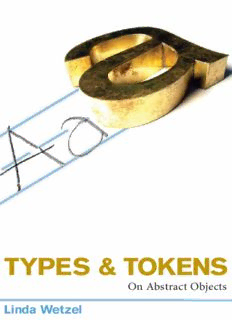
Types and Tokens: On Abstract Objects PDF
Preview Types and Tokens: On Abstract Objects
TYPES & TOKENS On Abstract Objects Linda Wetzel Types and Tokens Types and Tokens: On Abstract Objects Linda Wetzel The MIT Press Cambridge, Massachusetts London, England © 2009 Massachusetts Institute of Technology All rights reserved. No part of this book may be reproduced in any form by any electronic or mechanical means (including photocopying, recording, or information storage and retrieval) without permission in writing from the publisher. MIT Press books may be purchased at special quantity discounts for business or sales promotional use. For information, please e-mail special_sales@mitpress.mit.edu or write to Special Sales Department, The MIT Press, 55 Hayward Street, Cambridge, MA 02142. This book was set in Stone Sans and Stone Serif by SNP Best-set Typesetter Ltd., Hong Kong and was printed and bound in the United States of America. Library of Congress Cataloging-in-Publication Data Wetzel, Linda, 1951–. Types and tokens : on abstract objects / Linda Wetzel. p. cm. Includes bibliographical references and index. ISBN 978-0-262-01301-7 (hardcover : alk. paper) 1. Type and token (Linguistics). 2. Language and languages—Philosophy. I. Title. P128.T94W47 2009 111′.2—dc22 2008043056 10 9 8 7 6 5 4 3 2 1 For Sylvain Bromberger and Richard Cartwright Contents Acknowledgments ix Introduction xi 1 The Data 1 Type–Token Use in Philosophy 1 The Data 3 Conclusion 21 2 Types Exist 23 1 Types Exist 24 2 Objections 28 3 The Alleged Trouble with Abstract Objects 30 Conclusion 50 3 Paraphrasing, Part One: Words 53 1 Goodman’s and Sellars’s Suggestion 55 2 Words 58 Conclusion 70 4 Paraphrasing, Part Two 73 1 Other Paraphrases 73 2 Characterizing Statements 77 3 Old Glory 85 4 Quantification 87 5 Class Nominalism 88 Conclusion 92 5 The Trouble with Nominalism 93 1 What Goodman and Quine Say 93 2 The Trouble with Nominalism 99 Conclusion 103 viii Contents 6 Remarks on a Theory of Word Types 105 1 Kinds 106 2 Questions (1) through (5) 112 Conclusion 124 7 A Serious Problem for Realism? 125 1 What Are Occurrences of Expressions? 125 2 What Are Occurrences Generally? 130 3 David Lewis’s “Against Structural Universals” 138 Concluding Remarks 150 Notes 151 References 163 Index 175 Acknowledgments Although the bulk of this book was written during the period 1996–1999, some material appeared in print earlier than 1996, and revisions were made up until 2007. Thus there has been ample time for teachers, colleagues, students, friends, and anonymous reviewers to make suggestions and criti- cisms that have had a constructive impact on this book (and ample time for me to forget some of their contributions). As it is impossible to acknowl- edge all these contributions, below are the names of those who get the lion’s share of the credit. My long-time mentor, Sylvain Bromberger, contributed to my apprecia- tion of the importance of types, especially in linguistics. Although our views diverge in signifi cant ways, his early platonic views about types informed my own view. He raised the question of the relationship of types to their tokens, and his later nominalist views about types served as a foil to my own platonist views. He has commented generously on drafts for encyclopedia entries I’ve published on types and tokens, and most importantly, he has offered his invaluable comments on this book at an American Philosophical Association’s “Author Meets Critics” session. Over the years I’ve been much infl uenced by my thesis supervisor, Dick Cartwright, both for his general approach to metaphysics, with its careful scrutiny of ordinary and scientifi c language, as well as for his platonism. He kindly lent me his unpublished lecture notes on abstract objects, which opened my eyes to the diversity to be found among abstract objects and enlightened me on the difference between tokens and occurrences. Along with Dick Cartwright, the late George Boolos effectively turned me into a platonist with his comments on one of my early efforts defending, of all things, nominalism. His guidance, concern, and support over the years were invaluable. The late Jerry Katz lent a sympathetic, patient, platonist ear over the course of many discussions and arguments. His unabashed platonism served as a foil to my more abashed platonism.
Description: